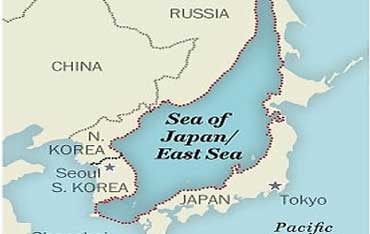- California Assembly OKs highest minimum wage in nation
- S. Korea unveils first graphic cigarette warnings
- US joins with South Korea, Japan in bid to deter North Korea
- LPGA golfer Chun In-gee finally back in action
- S. Korea won’t be top seed in final World Cup qualification round
- US men’s soccer misses 2nd straight Olympics
- US back on track in qualifying with 4-0 win over Guatemala
- High-intensity workout injuries spawn cottage industry
- CDC expands range of Zika mosquitoes into parts of Northeast
- Who knew? ‘The Walking Dead’ is helping families connect
‘Japan lobbied hard over East Sea bill in Virginia’
By Jane Han
NEW YORK ― After a lot of drama and surprising episodes, the controversial East Sea bill finally passed Virginia’s House of Delegates. It’s a victory worth celebrating, but last-minute snags demonstrate just how persistent and strategic Japan is over the issue, say people involved with the bill.
”The abrupt turn of events we saw at the very end was totally out of the blue. I never imagined something like that to come up,’’ said Peter Kim, head of Voice of Korean Americans (VoKA), a civic group that led Virginia’s years-long East Sea campaign.
A poison pill amendment was almost slipped into the high-profile legislation, which would require school textbooks to label the body of water between Korea and Japan as both the Sea of Japan and East Sea. With only the House vote left in the procedure, a surprise bid to amend the legislation surfaced earlier this week.
The amendment was proposed with arguments that African Americans and native Americans need ”appropriate textual treatment’’ as well, a reason Korean-Americans see as ”bogus.’’
”Why are we talking African Americans and native Americans all of a sudden? This bill really has nothing to do with them,’’ said Kim, who strongly believes that intense Japanese lobbying down the final stretch is what led to the surprise snag.
”This was definitely not one of the things we anticipated. The connection between the two issues just seems too forceful,’’ said an official of the Korean-American Association of Northern Virginia, who didn’t want to be named.
”We know that the lobbying firm for Japan has been working hard even after the bill was passed in both the House of Delegates and the Senate, so we can only speculate that the attempted amendment has something to do with the Japanese side,’’ he added.
In December, the Japanese Embassy in Washington D.C. signed a $75,000 contract with a major U.S. public affairs firm in an effort to derail the East Sea bill, according to media reports.
The high-stakes legislation has put Virginia Governor Terry McAuliffe in a tough spot, as the written promise he gave Korean-Americans during his campaign upset Japan, one of Virginia’s major trading partners.
”I know it’s a very difficult legislation for the governor to sign so he probably did not want the bill to come to his desk,’’ said Kim. ”There must’ve been a whole lot of politics involved behind the scenes and there is no doubt that the Japanese were deeply involved as well.’’
Kim says the way Japan lobbied in Virginia is ”beyond expected,’’ which completely caught them off guard.
”This is how they work. Other states need to learn from this and make sure they don’t put their guard down until the very end. Even if you think it’s over, it’s not over for them,’’ he stressed.
Six other states, including New York and California, are pushing to pass similar East Sea bills.
















